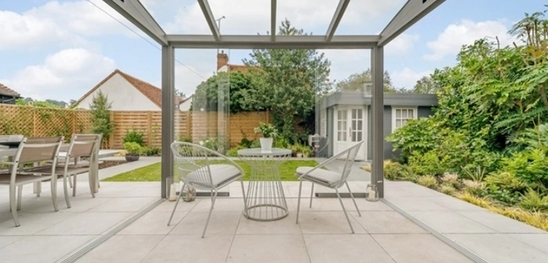
There was once a time when porcelain was considered a fragile, delicate material, reserved for use in tea sets and trinkets. However, new technologies and firing techniques have allowed manufacturers to create thicker and more durable porcelain products.
Since these advancements people have been made aware of the potential and versatility of porcelain. More and more uses have been found through decades of developments, and that includes paving. Porcelain is an extremely popular paving option, but if you're here reading this article, you're probably wondering if porcelain is worth the hype?
Well, we're here to compare porcelain with some of the most popular paving alternatives; ceramic and granite (there are lots of other stone options, but they have largely similar traits so only one stone example is really needed for this comparison). We'll be comparing the options on three of the most important factors; strength, maintenance, and aesthetic.
Strength:
Porcelain:
Porcelain is a very dense, sturdy material. Porcelain is thicker in composition and more hard-wearing than standard ceramic tiles. This is because porcelain is baked at such a high temperature so that it ‘vitrifies’, converting it into a solid, dense material.
Ceramic:
Ceramic tiles have a glazed top surface; this makes them relatively sturdy, but not nearly as strong and durable as porcelain tiles.
Granite:
Granite is also a notably strong paving option, and might even have a larger load-bearing capacity than porcelain. Unfortunately, what granite makes up for in physical strength, it lacks in maintenance.
Maintenance:
Porcelain:
Porcelain is famously low-maintenance! Since it has a very low porosity level (less than 0.05%), it doesn't need to be sealed like most traditional stone paving options. In fact, the only kind of maintenance you'll have to do with your porcelain paving is a warm, soapy jet wash once a year. Porcelain's low porosity also has other advantages, such as being highly stain-resistant!
Ceramic:
Ceramics glazed top surface makes it less porous than traditional stone options like granite, but it just doesn't compare with the durability and long-lasting nature of porcelain.
Granite:
Unlike porcelain paving, natural stones like granite are unfortunately very porous, and thus very high maintenance. They need to be treated extensively, and can still be heavily affected by moisture.
Aesthetic:
Aesthetic is something that's very relative and unique to each individuals' preferences. However, it's worth noting that one benefit of the versatility of porcelain is that it allows it to be produced in different colours and aesthetics. If your personal tastes are inclined towards a stone-like aesthetic such as slate, sandstone, traditional stone, limestone, quartz, or multiple others, porcelain tiles are available in these styles. This adaptability allows you to have the appearance of a more classic, traditional stone, and yet enjoy the durability, strength, and low maintenance of porcelain!
In terms of maintenance, strength, and aesthetics, porcelain paving just can't be beaten! And with the fact that its price per m2 is competitive with the most common alternatives... well, it speaks for itself!
Want to see for yourself? Order a free sample and experience our quality porcelain first-hand! We now offer full-size samples, so you can really see the beauty of our porcelain products before making a decision.
Order Your Samples >